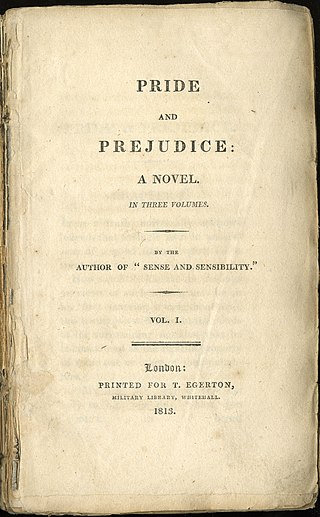
Pride and Prejudice is an 1813 novel of manners by Jane Austen. The novel follows the character development of Elizabeth Bennet, the dynamic protagonist of the book who learns about the repercussions of hasty judgments and comes to appreciate the difference between superficial goodness and actual goodness.

Madama Butterfly is an opera in three acts by Giacomo Puccini, with an Italian libretto by Luigi Illica and Giuseppe Giacosa.
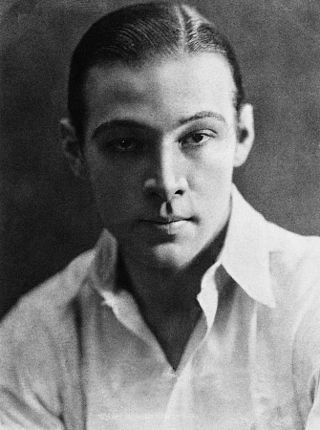
Rodolfo Pietro Filiberto Raffaello Guglielmi di Valentina d'Antonguolla, known professionally as Rudolph Valentino and nicknamed The Latin Lover, was an Italian actor based in the United States who starred in several well-known silent films including The Four Horsemen of the Apocalypse,The Sheik,Blood and Sand,The Eagle, and The Son of the Sheik.

A Letter to Three Wives is a 1949 American romantic comedy-drama which tells the story of a woman who mails a letter to three women, telling them she has left town with the husband of one of them, but not saying which one. It stars Jeanne Crain, Linda Darnell, Ann Sothern, Paul Douglas, Kirk Douglas, and Jeffrey Lynn. Thelma Ritter as "Sadie" and Celeste Holm are both uncredited.

Gloria May Josephine Swanson was an American actress and producer. She first achieved fame acting in dozens of silent films in the 1920s and was nominated three times for the Academy Award for Best Actress, most famously for her 1950 return in Billy Wilder's Sunset Boulevard, which also earned her a Golden Globe Award.

The Trespasser is a 1929 American pre-Code film written and directed by Edmund Goulding and starring Gloria Swanson, Robert Ames, Purnell Pratt, Henry B. Walthall, and Wally Albright. The film was released by United Artists in both silent and sound versions.

The Age of Innocence is a 1920 novel by American author Edith Wharton. It was her eighth novel, and was initially serialized in 1920 in four parts, in the magazine Pictorial Review. Later that year, it was released as a book by D. Appleton & Company. It won the 1921 Pulitzer Prize for Fiction, making Wharton the first woman to win the prize. Though the committee had initially agreed to give the award to Sinclair Lewis for Main Street, the judges, in rejecting his book on political grounds, "established Wharton as the American 'First Lady of Letters'". The story is set in the 1870s, in upper-class, "Gilded Age" New York City. Wharton wrote the book in her 50s, after she was already established as a major author in high demand by publishers.

Athene Seyler, CBE was an English actress.

Elinor Glyn was a British novelist and scriptwriter who specialised in romantic fiction, which was considered scandalous for its time, although her works are relatively tame by modern standards. She popularized the concept of the it-girl, and had tremendous influence on early 20th-century popular culture and, possibly, on the careers of notable Hollywood stars such as Rudolph Valentino, Gloria Swanson and, especially, Clara Bow.
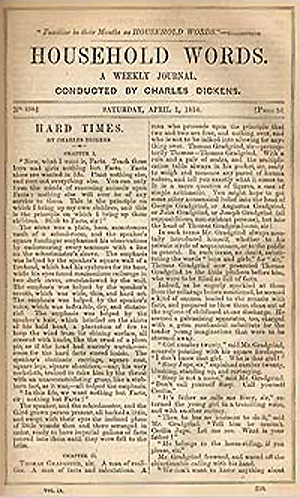
Hard Times: For These Times is the tenth novel by Charles Dickens, first published in 1854. The book surveys English society and satirises the social and economic conditions of the era.

The Beautiful and Damned is a 1922 novel by American writer F. Scott Fitzgerald. Set in New York City, the novel's plot follows a young artist Anthony Patch and his flapper wife Gloria Gilbert who become "wrecked on the shoals of dissipation" while excessively partying at the dawn of the hedonistic Jazz Age. As Fitzgerald's second novel, the work focuses upon the swinish behavior and glittering excesses of the American social elite in the heyday of New York's café society.

Can You Forgive Her? is a novel by Anthony Trollope, first published in serial form in 1864 and 1865. It is the first of six novels in the Palliser series, also known as the Parliamentary Novels.

The Young Rajah is a 1922 silent film starring Rudolph Valentino. The film was based on the book Amos Judd by John Ames Mitchell.

Jane Eyre is a 2006 television adaptation of Charlotte Brontë's 1847 novel of the same name. The story, which has been the subject of numerous television and film adaptations, is based on the life of the orphaned title character. This four-part BBC television drama serial adaptation was broadcast in the United Kingdom on BBC One.

A Suitable Boy is a novel by Vikram Seth, published in 1993. With 1,349 pages, the English-language book is one of the longest novels published in a single volume.
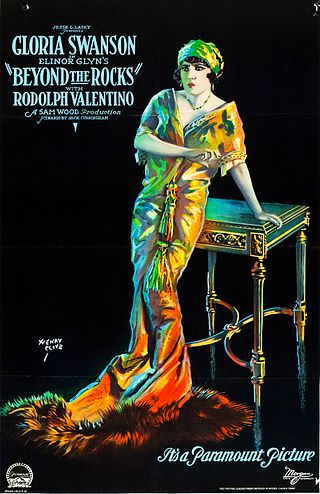
Beyond the Rocks is a 1922 American silent romantic drama film directed by Sam Wood, starring Rudolph Valentino and Gloria Swanson. It is based on the 1906 novel of the same name by Elinor Glyn. Beyond the Rocks was long considered lost but a nitrate print of the film was discovered in the Netherlands in 2003. The film was restored and released on DVD by Milestone Film & Video in 2006.
"I Dies from Love" was the eighth episode of the first series of the British television series, Upstairs, Downstairs. The episode is set in the summer of 1907.

Moran of the Lady Letty is a 1922 American silent adventure drama film directed by George Melford and stars Rudolph Valentino and Dorothy Dalton. Melford and Valentino had previously worked together on the box office hit The Sheik, in 1921. The film is based on the novel of the same name by Frank Norris and was adapted for the screen by Monte Katterjohn.
Captain Frederick Wentworth is a fictional character in the 1817 novel Persuasion written by Jane Austen. He is the prototype of the new gentleman in the 19th century: a self-made man who makes his fortune by hard work rather than inheritance.
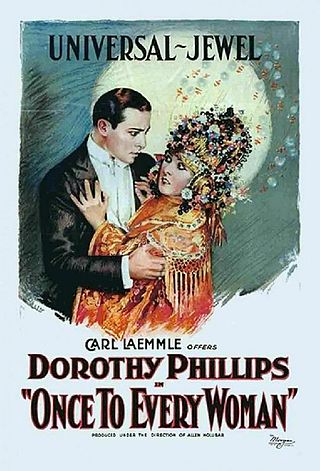
Once to Every Woman is a 1920 American silent drama film starring Dorothy Phillips, directed by Allen Holubar and released by Universal Pictures under the name Jewel Production. Supporting actors include Margaret Mann and a then-unknown Rudolph Valentino. It was re-released in 1922 after Valentino's increased popularity. It is now a lost film.



















